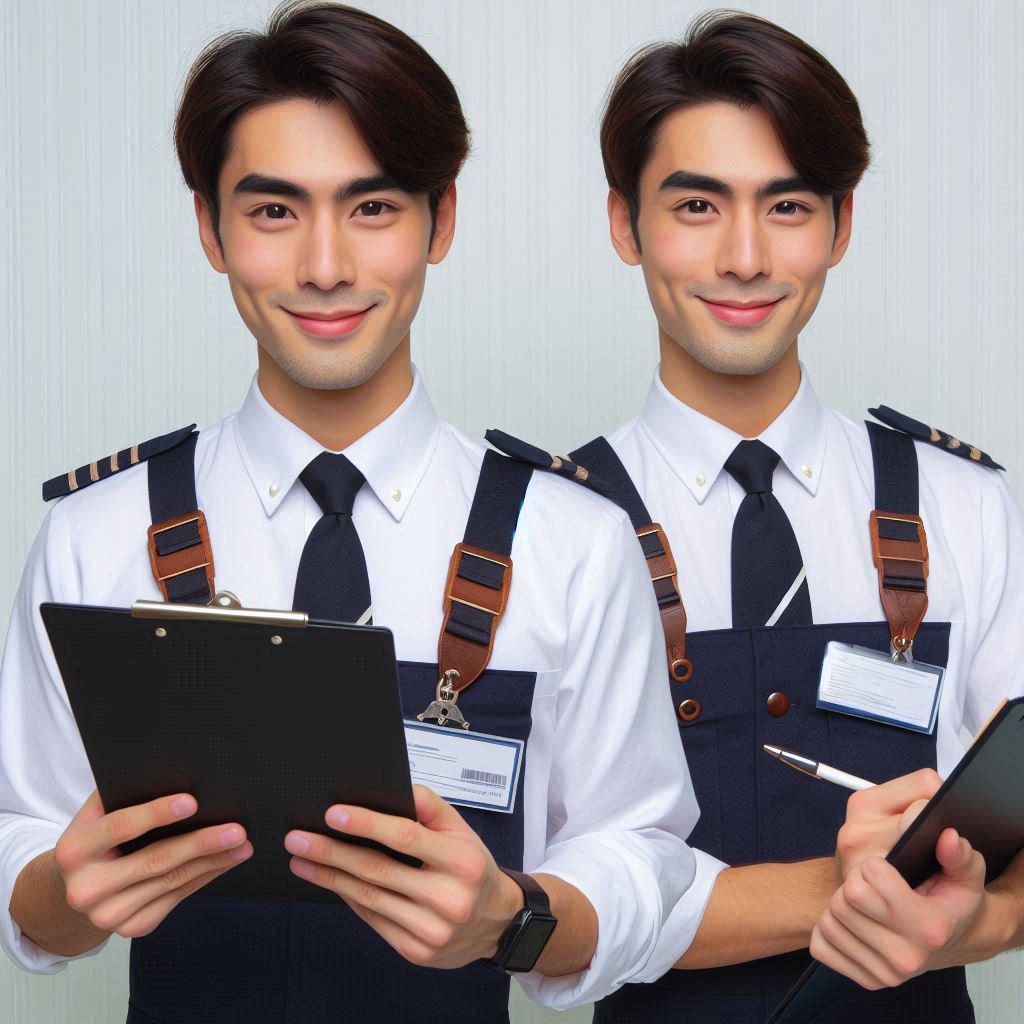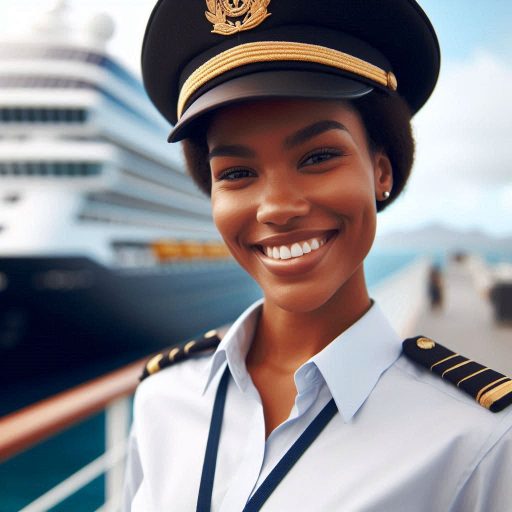Introduction
Joining a cruise ship as a staff member can be an exciting yet daunting experience.
Before taking on the responsibilities of their roles, new employees must undergo orientation.
Cruise ship staff orientation is a comprehensive introduction to the ship’s policies, procedures, and safety protocols.
It familiarizes new employees with their roles and responsibilities onboard.
Staff orientation is crucial for new employees as it provides them with the necessary information and training to perform their duties effectively.
It helps them adapt to the ship’s environment and culture.
This initial training also ensures that staff members are well-prepared to handle any emergencies that may arise during the cruise.
Overview of the Cruise Ship Staff Orientation Process
Cruise ship staff orientation is essential for new employees.
It prepares them for their roles aboard the ship.
Orientation typically lasts several days, ensuring comprehensive training.
New staff members can expect an engaging and informative experience.
Duration of Orientation
The orientation usually spans three to five days.
This timeframe allows for in-depth training and adjustment.
Each day covers specific topics relevant to ship operations.
Staff may receive a detailed schedule outlining daily activities.
This schedule helps everyone stay organized and informed.
Different Activities and Sessions Included
Orientation includes various activities and sessions to facilitate learning.
New hires often start with welcome speeches from senior staff.
These speeches set the tone for a positive work environment.
Next, staff participates in safety training.
Transform Your Career Today
Unlock a personalized career strategy that drives real results. Get tailored advice and a roadmap designed just for you.
Start NowThis training emphasizes emergency procedures and safety protocols.
Additionally, orientation includes department-specific training.
Each department conducts sessions to explain their operations.
For example, the galley team might cover food safety and preparation procedures.
This ensures that everyone understands their roles within the larger team.
Team-building activities are also common during orientation.
These activities help foster camaraderie among new hires.
Participants engage in icebreakers and group challenges, building rapport.
Networking opportunities arise as staff meets colleagues from various departments.
New hires also receive essential information about ship policies.
This includes dress codes, work hours, and guest interactions.
Understanding these policies is crucial for maintaining a professional environment.
Finally, staff will have time for questions and answers.
This open forum allows new hires to clarify any concerns.
Overall, cruise ship staff orientation equips employees for success.
It blends training, team-building, and policy education effectively.
New staff will leave orientation feeling prepared and confident.
Read: How to Transition to Advertising Design from Another Field
Pre-Orientation Preparations for New Staff
Starting a new job on a cruise ship is exciting yet demanding.
Proper pre-orientation preparations help ensure a smooth transition for new staff.
Transform Your Career Today
Unlock a personalized career strategy that drives real results. Get tailored advice and a roadmap designed just for you.
Start NowRequired Documents and Paperwork
Before orientation, gather all required documents.
These may include identification, medical certificates, and certifications relevant to your position.
Cruise lines typically require a passport and a seafarer‘s medical certificate.
Complete all necessary paperwork before arrival to avoid delays.
Some documents may need notarization, so check the specific requirements.
It is essential to ensure all documents are valid and up-to-date.
Consider creating a checklist of needed items to stay organized.
Submit your paperwork electronically if possible to streamline the process.
Having your documents in order reduces stress during the orientation period.
Uniform Fittings and Distribution
Uniforms are a crucial aspect of working on a cruise ship.
Each department has specific uniforms that reflect its brand and standards.
During orientation, you will have a fitting for your designated uniform.
This fitting ensures the uniform fits properly and meets safety regulations.
Pay attention to sizing, as adjustments may be needed.
Once fitted, your uniform will be distributed, so you are prepared for your duties.
Understand the guidelines for uniform maintenance and appearance.
Proper care of your uniform reflects your professionalism and the cruise line‘s image.
Arriving at orientation with a clean, well-fitted uniform boosts your confidence and readiness.
By completing these pre-orientation preparations, you set yourself up for success.
Being organized and well-prepared helps you transition smoothly into your new role.
Transform Your Career Today
Unlock a personalized career strategy that drives real results. Get tailored advice and a roadmap designed just for you.
Start NowEmbrace the opportunity to learn and grow in the vibrant environment of a cruise ship.
Your journey is just beginning, and a successful start can lead to a fulfilling career at sea.
Read: Essential Packing List for Cruise Ship Employees
Welcome session
In cruise ship staff orientation, the first step is the welcome session where new employees are greeted by senior staff members.
This sets the tone for the orientation and helps in creating a positive atmosphere.
Greetings from senior staff members‘
During the welcome session, senior staff members typically give a warm welcome to the new employees.
They introduce themselves and express their excitement about having the new staff on board.
Introduction to key team members
New hires are also introduced to key team members during the orientation.
This may include department heads, supervisors, and other staff who will be working closely with the new employees.
By meeting these key team members early on, new hires can establish relationships and feel more comfortable in their new environment.
Read: Advertising Design: Building a Personal Brand

Safety Training
During cruise ship staff orientation, safety training is a top priority for all employees.
This training includes learning about emergency procedures and protocols to ensure the safety of passengers and staff.
Staff members are educated on how to respond in various emergency situations that may arise while at sea.
They are also trained on the proper use of safety equipment like life jackets and fire extinguishers.
Drill rehearsals and simulations are conducted regularly to practice emergency response protocols in a realistic setting.
Emergency Procedures and Protocols
Staff members are briefed on the specific emergency procedures and protocols that are in place on the cruise ship.
They learn about different types of emergencies that could occur, such as fires, medical emergencies, or severe weather.
Each staff member is assigned a specific role and responsibility in the event of an emergency.
Clear communication protocols are established to ensure quick and effective response to any emergency situation.
Transform Your Career Today
Unlock a personalized career strategy that drives real results. Get tailored advice and a roadmap designed just for you.
Start NowStaff are trained to remain calm and follow instructions from designated leaders during emergencies.
Drill Rehearsals and Simulations
Regular drill rehearsals and simulations are conducted to ensure that staff members are well-prepared for emergencies.
During these drills, staff practice evacuating passengers to designated assembly points in a timely manner.
Simulations of various emergency scenarios help staff to understand their roles and responsibilities better.
Feedback from these drills is used to identify areas for improvement and enhance emergency preparedness.
Overall, drill rehearsals and simulations are critical to maintaining a high level of safety on board the cruise ship.
Read: Top Skills Needed for a Cruise Ship Service Career
Departmental Introductions
Starting a new job on a cruise ship is exciting.
One key part of orientation is departmental introductions.
This process familiarizes staff with the ship’s structure and culture.
Each department plays a unique role in creating unforgettable guest experiences.
Tour of Different Departments on the Ship
During orientation, you will embark on a tour of various departments.
This tour highlights essential areas like housekeeping, dining, and entertainment.
You will meet department heads and key staff members.
They will share insights about their teams and operations.
Each department’s function is vital to the ship‘s overall success.
Understanding how departments interact fosters teamwork and collaboration.
The tour often includes the galley, where chefs prepare meals.
You might visit the bridge, where officers navigate the ship. Each stop offers a glimpse into daily operations.
This experience helps new staff understand how their roles contribute to the big picture.
Transform Your Career Today
Unlock a personalized career strategy that drives real results. Get tailored advice and a roadmap designed just for you.
Start NowOverview of Roles and Responsibilities
Following the tour, you will receive an overview of roles and responsibilities within each department.
Department heads will explain their team’s specific tasks.
This information is crucial for understanding expectations and workflows.
Knowing who handles what enhances communication and efficiency.
Each position comes with unique responsibilities.
For example, the housekeeping team maintains cleanliness throughout the ship.
Meanwhile, the entertainment department organizes events and activities for guests.
Understanding these roles helps you see where you fit into the team.
You will also learn about safety protocols and guest service standards.
Familiarizing yourself with these expectations is essential for success.
Orientation will prepare you to meet the cruise line’s high service standards.
Therefore, departmental introductions during orientation lay the foundation for your cruise ship career.
Embrace this opportunity to learn and connect with your colleagues.
What to Expect During Cruise Ship Staff Orientation
Team-Building Activities
Team-building activities are crucial during cruise ship staff orientation. They help foster camaraderie among new hires.
These activities encourage open communication and collaboration, making it easier to work together.
Icebreakers and Group Exercises
Icebreakers are fun ways to start the orientation. They help introduce staff members to one another in a relaxed setting.
Common icebreakers include sharing fun facts or playing name games. These activities help break down barriers and reduce initial anxiety.
Group exercises focus on collaboration and problem-solving.
Participants might tackle challenges that require teamwork and creativity. For instance, staff could engage in role-playing scenarios related to their jobs.
These exercises provide practical experience in a supportive environment.
Transform Your Career Today
Unlock a personalized career strategy that drives real results. Get tailored advice and a roadmap designed just for you.
Start NowBonding with Fellow Staff Members
Bonding with fellow staff members is essential for building a strong team. The cruise ship environment requires teamwork to ensure guest satisfaction.
Spending time together during team-building activities helps create lasting friendships.
As staff members bond, they learn to trust and support each other. This connection improves communication and boosts morale on board.
New hires often feel more comfortable asking for help or sharing ideas.
Overall, team-building activities during orientation play a vital role. They promote a positive work environment and foster collaboration.
Staff members leave orientation feeling connected and supported. This strong foundation contributes to the ship’s success and enhances guest experiences.
By engaging in icebreakers and group exercises, staff members develop teamwork skills.
Bonding with colleagues creates a sense of belonging.
Together, these elements set the stage for a successful and enjoyable cruise experience.
You Might Also Like: Client Communication Tips for Real Estate Agents
Explore Further: Day in the Life of a Loan Officer: Service Industry Insights
Conclusion
Cruise ship staff orientation sets the tone for a successful journey ahead.
Understanding key takeaways helps new hires transition smoothly.
First, staff learn about ship operations.
Familiarity with the ship’s layout enhances efficiency and safety.
Second, orientation covers essential policies and procedures.
Knowing these rules fosters a respectful and professional work environment.
Networking is another critical aspect of orientation.
Building relationships with colleagues boosts teamwork and camaraderie.
Orientation also emphasizes the importance of guest service.
Transform Your Career Today
Unlock a personalized career strategy that drives real results. Get tailored advice and a roadmap designed just for you.
Start NowStaff learn that excellent service enhances guests’ experiences and drives positive reviews.
Emotional resilience is vital for cruise staff.
Orientation helps new hires recognize the challenges of working at sea.
They gain strategies for managing stress and maintaining work-life balance.
Additionally, staff are introduced to training opportunities.
Continuous learning ensures employees remain competitive in the cruise industry.
Being well-prepared is essential for starting work on a cruise ship.
A strong foundation from orientation empowers staff to excel in their roles.
Preparation helps new hires feel confident and ready to serve guests.
It also fosters a positive mindset, crucial for overcoming challenges.
Embracing the orientation experience prepares staff for success.
The knowledge gained and connections formed create a supportive work environment.
New hires should approach their roles with enthusiasm and commitment.
This attitude not only benefits their careers but also enriches the experiences of guests.
Cruise ship staff orientation equips employees with vital skills and knowledge.
Understanding operations, policies, and guest service enhances overall performance.
By being well-prepared, new staff members can thrive in their roles and contribute to a memorable cruise experience for everyone involved.
[E-Books for Sale]
The Big Book of 500 High-Paying Jobs in America: Unlock Your Earning Potential
$19.99 • 500 High-Paying Jobs • 330 pages
Explore 500 high-paying jobs in America and learn how to boost your career, earn more, and achieve success!
See All 500 High-Paying Jobs of this E-Book
1001 Professions Without a Degree: High-Paying American Jobs You Can Start Now
$19.99 • 1001 Professions Without a Degree • 174 pages
Discover 1001 high-paying jobs without a degree! Unlock career tips, skills, and success strategies for just $19.99!




